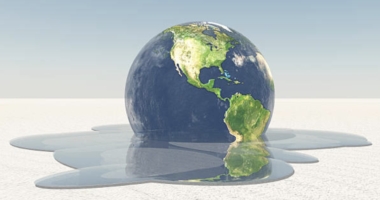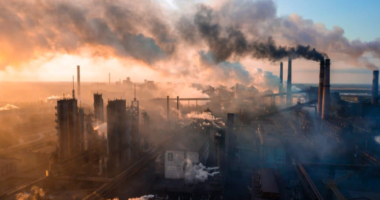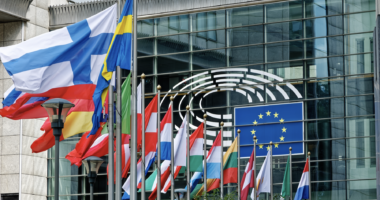Climate, Health and Equity Brief
Atmospheric update, coal’s staying power and the U.S. makes moves
April 29, 2024

The Climate, Health & Equity Brief is GMMB’s take on the latest news on the current impacts of climate change. If you haven’t subscribed yet, you can do so by clicking here.
Hot Topic: Atmospherics. In a new NOAA analysis, scientists have confirmed that emissions from fossil fuels continue to rise and that atmospheric levels of CO2 are more than 50% higher—and methane levels 160% higher—than pre-industrial levels. Today, the continued increase represents a notable change even from just eight years ago, when the Paris Agreement— the legally binding treaty in which 194 countries and the E.U. committed to reducing emissions—entered into force.
Despite the West’s progress in moving away from coal, the world’s dirtiest fossil fuel continues to help drive this atmospheric increase. While the U.S. remains on track to close half of its coal-fired plants by 2026, a slowdown in coal plant retirements in Western economies, combined with a wave of new coal plant construction in China—and to a lesser extent, several other countries in the region—resulted in global operating coal capacity growing by 2% in 2023.
And as emissions continue to fuel unrelenting temperature increases around the world, workforces are feeling the heat. A new UN analysis found that 70% of the world’s workers face climate change-related health risks, with more than 2.4 billion people now likely to be exposed to excessive heat on the job. Despite this reality, this month, Florida joined Texas in banning local and municipal governments from requiring their own worker heat protections—even though an estimated 2 million people working outdoors in the state, which set numerous all-time heat records last year.
In the face of these grim reports, the Biden Administration continues to make important progress. In the first update to the federal oil and gas leasing program in more than 30 years, the Biden Administration finalized a rule requiring oil companies to pay 10 times more to drill on federal lands—the first increase since 1960. And the EPA has imposed a landmark mandate to cut CO2 emissions from U.S. power plants, a move that, if it can sustain expected legal and political hurdles, the EPA projects will result in a substantial 75% reduction in emissions by 2035.
Note: GMMB is a firm that I am proud to have worked with in some capacity last 40 years. As of this month, I am leaving GMMB to dive deeply into climate-related projects that require more of my time. This newsletter is a labor of love for our team. With it, we aim to underscore that climate change is an “everything” issue, touching health, equity, economic development, and virtually all of the things GMMB cares about. We are grateful for you, our readers, and the critical work you do each day to tackle this issue. We hope that this Brief continues to be valuable to your work, and I hope you will keep reading each issue – I certainly will.
– Matt James
Human Health
According to a new UN report, over 70% of workers globally face climate change-related health risks, including the more than 2.4 billion people who are currently exposed to excessive heat on the job each year. (CBS News)
The American Lung Association’s annual State of the Air Assessment found that nearly 40% of Americans were living in areas with unhealthy air between 2020-2022, an increase of almost 12 million compared to prior reporting from 2019-2021. (The Washington Post)
Heavy storms and rising sea levels are exacerbating and exposing disrepair in the Charleston, SC water system, which has reported 176 sewage spills of more than 500 gallons each since 2015. (Inside Climate News)
A new study across 204 countries found that more than half a million people died from a stroke linked to extreme temperatures in 2019. (CNN)
Planetary Health
Scientists have confirmed that the atmosphere now contains more planet-warming gases than it has in at least 4.3 million years, with CO2 concentrations now more than 50% higher than during pre-industrial levels, and methane levels 160% higher. (The Guardian)
Massive floods in Dubai have broken records, with over a year’s worth of rain falling in two days, underscoring issues with modern urban infrastructure and its failure to contend with ever-increasing extreme weather. (CNBC, The Washington Post)
The most extensive global coral bleaching event on record is expected to begin within several weeks—caused by extraordinarily warm ocean temperatures—after more than half the world’s coral experienced bleaching-level heat stress in the past year. (The New York Times)
Equity
Republican Attorneys General from 23 states filed a petition to stop the EPA from using the Civil Rights Act to regulate pollution, a first step in attempting to block the agency from tackling environmental justice and civil rights complaints such as those brought by residents of the infamous Cancer Alley. (Grist)
A Bank of Canada study suggests that climate change is driving increased demand for harmful predatory loans within low-income communities, which are becoming increasingly necessary for those close to poverty to afford increased medical and energy costs. (The Guardian)
A new poll among Asian American, Native Hawaiian, and Pacific Islander (AAPI) adults finds that 79% of have faced major weather events in the past five years, and 67% say extreme weather has strongly influenced their views, leading to increased civic action and support for environmental policies within the community. (AP/NORC)
Indigenous people in the northern latitudes—who are at high risk of toxicity from plastic pollution since micro- and nano-plastics are carried through ocean and air currents to the “hemispheric sink” of their Arctic homeland—are calling for environmental protection this week as global delegates gather in Ottawa for the Canada Plastics Treaty. (Inside Climate News)
The Gullah Geechee people, descendants of enslaved people who live along the U.S. Southeast coast, face flooding, storm surges and wildlife extinctions that threaten to erase their distinct way of life. (NBC News)
Politics & Economy
A combination of the slowed decommissioning of coal-fueled power plants in the West and new plants coming online in China—and to a lesser extent in Indonesia, India, Vietnam, Japan, Bangladesh, Pakistan and South Korea—increased global coal-fired power by 2% in 2023. (The New York Times)
In the first update to the federal oil and gas leasing program in more than 30 years, the Biden Administration finalized a rule requiring oil companies to pay 10 times more to drill on federal lands—the first such increase since 1960, despite significant inflation. (The Washington Post)
Florida joined Texas in banning local and municipal governments from requiring their own heat protections for workers despite an estimated 2 million people working outdoors in the state, which set numerous all-time heat records last year. (The Hill)
A new study from Consumer Reports found that climate change will cost each person born in 2024 $500,000 over their lifetime in higher housing, food, and healthcare costs, as well as potentially higher taxes and lost income in a warming world. (The Verge)
The state of New York is suing JBS, the world’s largest meat company, for claiming it would be net-zero by 2040 while later admitting it doesn’t know how to calculate all of its emissions, a decision that could have far-reaching implications for greenwashing across a range of industries. (The Guardian)
New research has found that extreme weather accounted for about 80% of all major U.S. power outages from 2000 to 2023, with heat-related outages more than doubling from 2000-2009 vs. 2014-2023. (Axios)
Life as We Know It
In the aftermath of climate-fueled disasters like wildfires and hurricanes, new books and storytelling initiatives are providing emotional support for children, offering them a framework to process trauma and enabling parents to engage in meaningful conversations about difficult experiences. (Scientific American)
As grazable land shrinks, water sources dry up, and yearslong droughts have killed 80% of Kenya’s cattle, regional governments and traditional herders in Kenya are trying out a new strategy—using camels instead of cows for milk, as the animals are more adaptable to climate change. (The Washington Post)
Action
The EPA has imposed a landmark mandate to cut carbon dioxide emissions from power plants, projecting a substantial 75% reduction in emissions by 2035 and associated benefits reaching $370 billion through 2047, yet the move is likely to face significant legal and political hurdles. (Axios)
Almost 600 new public fast-charging stations came online in the U.S. in the first three months of 2024, bringing the nation’s total to 8,200 quick-turn EV stations—one for every 15 gas stations. (Bloomberg)
President Biden announced $7 billion in funding from the Inflation Reduction Act for residential solar project grants that will power nearly a million low-income homes, creating an estimated 200,000 jobs and saving households in the program about $400 a year. (Reuters)
The U.S. Transportation Department awarded $830 million for projects to strengthen infrastructure against extreme weather, including improving drainage, moving roadways, raising bridges, and protecting, strengthening, and removing at-risk coastal infrastructure. (The Hill)
Kicker
Worried about heat risks in your area? Check out the Biden Administration’s new tool to monitor high temperatures and potential health impacts.
To reduce the risk of a global environmental catastrophe…the world must urgently bend the curve of global emissions away from fossil fuels.”
– Johan Rockstrom
The GMMB Climate, Health & Equity Brief would not be possible without the contributions of the larger GMMB team—Aaron Benavides, Stefana Hendronetto, Nikki Melamed, Sharde Olabanji and Marci Welford. Feedback on the Brief is welcome and encouraged and should be sent to [email protected].





